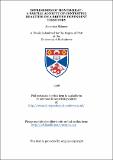Files in this item
Impressions of Montserrat : a partial account of contesting realities on a British dependent territory
Item metadata
| dc.contributor.author | Skinner, Jonathan | |
| dc.coverage.spatial | xlix, 358 p. | en_US |
| dc.date.accessioned | 2018-06-22T09:08:33Z | |
| dc.date.available | 2018-06-22T09:08:33Z | |
| dc.date.issued | 1998-05 | |
| dc.identifier.uri | https://hdl.handle.net/10023/14443 | |
| dc.description.abstract | This thesis portrays a diversity of impressions of Montserrat, a British Dependent Territory (BDT) in the Eastern Caribbean. The thesis is a postmodern rejection of Grand Theory in the Social Sciences. First I interrogate the nature of social anthropology, both its theoretical and methodological assumptions. I then establish my own anthropology which is postmodern - partial, relative, uncomfortable and uncertain, and above all, impressionistic. The substantial chapters in the thesis support this postmodern impressionistic anthropology by referring to an ethnographic encounter with the competing and highly contested realities expressed by myself, some Montserratian poets, some calypsonians, some development workers, some local Montserratians, some tourists and the Montserratian Government and Tourist Board, and some travel writers. More precisely, the Preface reviews social anthropology as an uncomfortable and uncertain discipline. It also establishes and justifies my postmodern impressionistic anthropology which is thereafter illustrated by ethnographic vignettes in the following chapters. Via the anthropologist's impressions. Chapter One introduces the reader to the place and people of Montserrat. In Chapter Two, Montserrat is filtered through poets' impressions of the island and islanders, namely through the poets of the Maroons Creative Writing Group which is led by Dr. Howard Fergus. Chapter Three goes on to show that impressions of Montserrat, despite their highly contested nature, can be held not just singularly - as in the case of individual poets, but also plurally - as constellations such as the contrasting world-views of Montserratians and development workers on Montserrat. Chapters Four and Five continue my ethnographic impressions of Montserrat by presenting, respectively, the labours of several calypsonians on Montserrat who seek public recognition for their work, and, union leader, Chedmond Browne's struggle to maintain the trade union workers' employment at Plymouth Port. The final two chapters - Chapter Six and Chapter Seven - recede (ethnographically) from Montserrat: the first by considering the competing impressions and controversial histories of St. Patrick's Day, an annual celebration and commemoration on Montserrat; and the second by presenting a diverse selection of travel writers' impressions of Montserrat. The contentious content of both chapters affirms and reinforces the need for my postmodern and impressionistic approach to an anthropological investigation on Montserrat. Finally, the Conclusion to the thesis sums up the aforementioned chapters and makes general comments towards establishing a reflexive and sustainable postmodern impressionistic anthropology. | en_US |
| dc.subject.lcc | F2082.S6 | en |
| dc.subject.lcsh | Anthropology--Caribbean Area | en |
| dc.subject.lcsh | Montserrat--Civilization | en |
| dc.title | Impressions of Montserrat : a partial account of contesting realities on a British dependent territory | |
| dc.type | Thesis | |
| dc.contributor.sponsor | University of St Andrews. Department of Social Anthropology | en_US |
| dc.contributor.sponsor | University of St Andrews | en_US |
| dc.contributor.sponsor | Russell Trust | en_US |
| dc.contributor.sponsor | Carnegie Trust for the Universities of Scotland | en_US |
| dc.contributor.sponsor | Royal Anthropological Institute of Great Britain and Ireland | en_US |
| dc.type.qualificationlevel | Doctoral | en |
| dc.type.qualificationname | PhD Doctor of Philosophy | en |
This item appears in the following Collection(s)
Items in the St Andrews Research Repository are protected by copyright, with all rights reserved, unless otherwise indicated.

